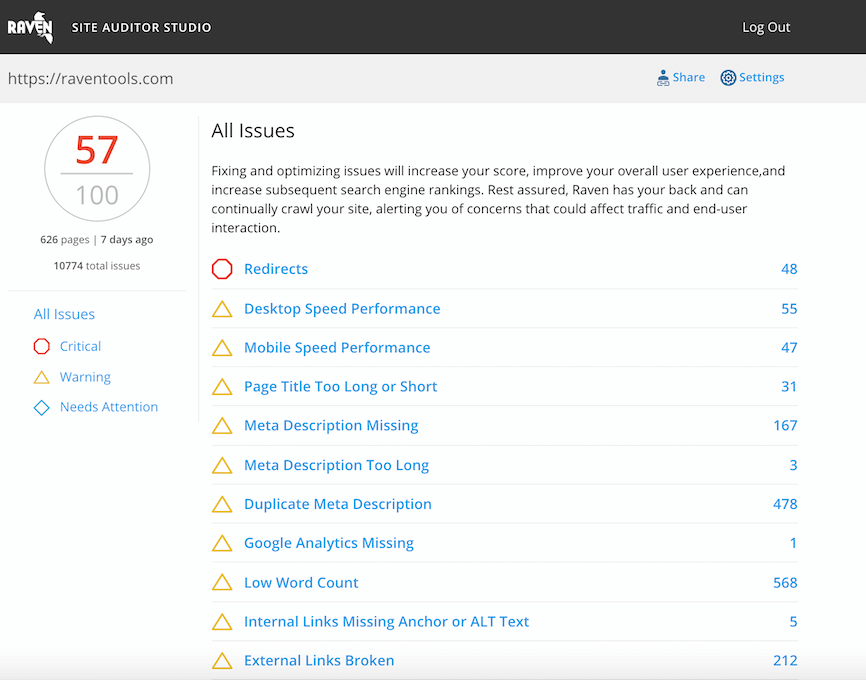Company blogs get used for a variety of purposes that are well beyond the purview of helpful, high quality content. They’re used for product updates, conferences and events, new hires, contests, webinars and much more. Here’s a good example of the kind of post I’m talking about.
Those type of posts are typically thin on content and are only relevant for a short period of time, and that’s a problem.
As time passes, these blogs collect a significant amount of irrelevant and thin content. This unnecessary content subsequently decreases the quality of the blog and dilutes the core themes it’s trying to rank for. That’s why those posts should have an expiration date and be deleted from the blog.
Deleting blog posts can be a scary proposition for some. However, what many people don’t understand is that it’s okay to have 404 page errors. Especially if the content is no longer relevant and it’s thin. There are no penalties for having 404 Not Found pages.
How to expire posts in WordPress
The easiest way to expire and delete posts in WordPress is with a plugin called WP Post Expires. We currently use the plugin on the Raven blog to expire timely and thin posts.
The plugin adds an expiration option to the Publish widget on the Post page. You can assign a date and time for it to expire, along with an action to Add Prefix, Move to Drafts or Move to Trash.
This plugin can be used on both old and new posts. When you review all of your existing posts to find time sensitive and thin content, you can either trash it or set it to expire. And as you create new time-sensitive, low quality posts, you can set the expiration date when you publish it.

Analyze over 20 different technical SEO issues and create to-do lists for your team while sending error reports to your client.






I was hoping to be blown away by some solid argument that would make me re-question my belief that blog posts should stay online regardless of their old age to serve SEO purpose, but I didn’t see any argument at all that answered the question asked in the post title.
Why is it “okay to have 404 page errors”? The other link “404 page errors” even seems to contradict the previous statement by recommending to clean up dead links to avoid ranking penalties.
I would love to hear more, but as it is now I’m not sure that the statement “this unnecessary content […] decreases the quality of the blog and dilutes the core themes it’s trying to rank for” is sufficient enough to convince me that I should expire my blog posts.
Please tell me more.
Unfortunately, there’s probably nothing I can say that will “blow you away” in regards to this topic. I can definitely expand on my thought process and experience removing content.
This isn’t the first time I’ve done a mass gutting of irrelevant pages that’s left a trail of 404s behind it. Each time I’ve done this, I’ve experienced zero decline in organic traffic. My theory is that it’s because 1) my assessment that the content was irrelevent was correct; 2) Google doesn’t penalize you for having 404s, especially to irrelevant content – content that doesn’t produce any clicks regardless of being indexed. My other theory, which has proved to be true over time, is that when you remove irrelevant content and keep your site’s content focused on your targeted themes and keywords, you rank better for it and improve your organic traffic.
Somewhat of a counter-argument to that would be Google’s shift towards giving more weight to individual pages, but I think their algo still evaluates and judges site based on its entirety, even if it’s to a lesser degree today.
Bottomline, there’s no reason to have irrelevant content on your site. It’s junk and it doesn’t serve any purpose other than to take up space and to potentially confuse visitors. And in my experience, there’s no penalty for removing it.
In regards to dealing with 404s, I generally do one of three things for each instance:
1. Find the page and fixing the URL if the content still exists.
2. Create a 301 redirect for the broken link to a relevant page on the site.
3. Ignore the 404 if the content is no longer available and there isn’t a relevant page to link to.
Thank you Jon for going in so much detail. Your answer is certainly much more convincing. I’m going to ponder on that and contemplate the idea for our websites.
Fantastic post. I’ve been pushing a “you are over contenting your site” message for years now… so well said and thanks.
After a long time, and with a purest view that blog posts should remain forever, I’ve started pruning a little bit. Just a little and on a case by case basis. The silly stuff. The stuff that’s irrelevant today. And topics on which I’ve changed my mind about (as it is with experience). Blogs today have experienced something akin to the product bloat of premise software in waterfall development; hence the advent of agile and lean. Those concepts have bled over from development to marketing for good reason.
I think getting rid of small or crappy content with no value is good.
Here’s why
I’d rather google crawl over my site and use its crawl budget in a way that is useful.
That Superbowl post from 2011 isn’t doing me any good.
Less URLs. More focus. 99℅ of all the content on the internet is garbage. I say keep 51℅ of it and be strategic about it.
Since 2009, all we’ve heard is create content. It’s time to circle back and admit our mistakes.
I wouldn’t have a 404. At scale, that would make site audits so annoying. Redirect these expired URLs to a funny page that rounds up your best stuff… Better for the visitor and your brand.
Stay classy.
Haha, I need to work on staying classy…with my 404s and redirects 😉
I would suggest checking for backlinks & landing page traffic before 404’ing old posts or pages. Even your example post (which I agree is thin & irrelevant after 5 years) could have collected a number of links back in the day. Since most websites don’t have many links, the loss of PR & various flow metrics from 404’ing a page with any backlinks could have a significant impact.
That’s a very valid point @2theTopDesign:disqus! I did do that with some, but I didn’t for content that I felt was quite irrelevant for what I want to rank for. It’s really a balance between the time and effort it will take. With some exceptions, if you have the time, then it probably is best to check most of them if you can.
I’m always inclined to toss in a redirect, either to something topically relevant or to a home page or other landing page. You’re right that having the 404 is not as bad as linking to one, but when I don’t have the time to check for backlinks, I just assume set a redirect.
Wouldn’t another valid option and perhaps more useful alternative be to just set expired content to become “noindex” after the expiration date? This would avoid creating a 404 error, still keep the backlink active to the domain as a whole, and also lighten the number of pages in Google’s index for you?
I think that’s definitely one way you could go about it. In my case, I simply didn’t want the content to exist anymore, period. For example, I didn’t want the content to show up in a site search, because it might be confusing and/or incredibly outdated.
But if you set to “noindex” they’d eventually get dropped out of search engines results as well right?
In theory yes. But I’m talking about not wanting those results to show up in WordPress’ search results, not Google’s. For example, I don’t want anyone who visits this blog and does a site search to find that old content. It’s not just a Google index problem.
Ah, that makes sense. I also get the keeping things simple and minimal. I just think there are some sites/clients who struggle with generating any kind of content. Sometimes these types of pages are about the only thing they’ve got to try and attract any type of search attention. Not a good situation for client or user. Just the reality sometimes.
Instead of a 404, consider returning a 410 error code for the content that is permanently removed, because it fits the use case better than a 404. https://www.w3.org/Protocols/rfc2616/rfc2616-sec10.html
410 is definitely the best code (based on protocol standards) to send if something is permanently deleted. However, that takes effort since it’s not the default protocol the server sends when something goes missing (nor should it be). 404 are automatic and harmless. Harmless in the sense that you can delete a bunch of pages, but then realize you want to bring one back or you find out that the page has some great backlinks to it and you want to add something back. There’s something about the permanence of a 410 that makes me uncomfortable. But again, based on its stated purpose, that’s the one to use if you’re intentionally removing something and don’t have any plans to replace it or redirect it to another page.